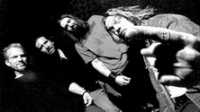CORROSION OF CONFORMITY is: Pepper Keenan - guitar/vocals Woody Weatherman - guitar Mike Dean - bass/vocals Reed Mullin - drums/vocals
In music, it's all about survival. It's about stayin' alive, stayin' relevant, stayin' crucial. In heavy music--where trends come and go more often than johns at a busy brothel--it's all about honesty, truth, and following your heart. For Corrosion of Conformity--who are releasing their sixth album, the devastating WISEBLOOD--if it's not about honesty, it's about jack-shit.
"We really try hard to be true to what our hearts tell us to do," says New Orleans-bred Pepper Keenan, guitarist and songwriter for the band. "We do what we feel and we don't want to get caught up in any '90s-style production bullshit, 'cause when we look back at what we've done we want it to sound timeless. So many bands are gonna laugh at themselves in ten years. We don't want that."
COC has been hurtling towards a "timeless" rock sound since their humble-but-turbulent beginning as a hardcore band way back in 1982. Back then, the band -- guitarist Woody Weatherman, bassist Mike Dean and drummer Reed Mullin (Keenan didn't join until 1990) -- searched desperately for a voice, an identifiable way to vent the spleen that has continued to haunt them through a full six records: 1983's vociferous Eye For An Eye, '85's phlegmatic rant Animosity, '87's drop D-tuned barrage Technocracy, '91's awesome, menacing Blind, and the album that serves as WISEBLOOD's most direct sonic ancestor: '94's breakthrough platter, Deliverance.
Since those hardcore days, it's been quite the trip, a phenomenal climb, in fact, that has seen the band successfully fuse the gaps between punk, thrash and metal with a power and skill rarely seen in other high-decibel bands. WISEBLOOD, the latest rung on their climb and the first time ever the band has recorded two albums with the same line-up, is proof that Corrosion of Conformity has finally nailed the profound "timelessness" they've been searching for.
"We began carving our niche with Deliverance," says Keenan with a hint of the South in his voice. "Now that we have that niche we should stay in it. I often wonder what makes good bands take sudden left turns. Why would you work hard to develop a sound and then just abandon it? It makes no sense."
What does make sense is the band's tight-fisted focus. WISEBLOOD is a raw 'n' nasty, in-your-face record exploding with "big rock songs," full of knuckle-busting riffs and sophisticated (but not entangling) arrangements. It's a record that will surely vault COC to the forefront of rock and one that could become a standard by which future rock albums will be measured.
"We've always tried to make albums that have highs and lows and midpoints," says Keenan, "records that you can listen to from beginning to end. We've got no interest in ramming ten songs in the same key down your throat."
Gritty and diverse tracks like "Man or Ash" (featuring Metallica's James Hetfield in his first-ever guest role), the chainsaw-powered "King of the Rotten," and the hardcore-rooted "Wishbone (Some Tomorrow)" show a COC virtually reborn, a band with a crystal clear vision. Musically and lyrically, the band has outdone themselves. Their dense and full-throttle performances seem like too much music to fit onto two-inch studio tape.
"Bottom Feeder," a torrid instrumental that closes out the record, is a good example of where Corrosion of Conformity is headed. Drummer Mullin explains the song's inspiration: "We all go catfishing with our friend Thedford B. Sampson. He's about 68, got eighteen kids spread across the country and he takes us catfishing in the middle of the night. We stick chicken livers on a hook, put a bell on the end of the line and if the bell jingles you know you got something. Thedford would say, 'We gonna get us a big cat, Poppa!' That song's about him."
Elsewhere, Keenan recounts the musical birth of "Drowning In A Daydream," the album's first single. "I would see all these people around me with big dreams, guys who were hopin' to get their lives together. But they'd get so discouraged they weren't makin' it that they forget that getting there was half the fun."
Both Keenan and Mullin point to producer John Custer as the catalyst for the band's intensity on WISEBLOOD. "The kudos all go to John," Mullin admits. "He's responsible for making us run through the mill. None of us would have accomplished what we've accomplished without him. He's been a part of our vision for a long time."
Though it has nothing to do with either Flannery O'Connor or Jim Thirlwell, the term "WISEBLOOD" does have a story behind it. The idea stemmed from Keenan's oddball experience at a Raleigh boarding house, the place where he escaped to write the lyrics to most of the band's new songs. Keenan lived there for a few months, reducing the material objects in his life to a desk, a two-channel TV, a radio and a Black Sabbath poster on the wall. He'd write a lyric, then tape it to the wall, so by the end of his stay he was surrounded by white sheets of paper.
"These guys at the boarding house would come in and think I was some kind of freak or burned-out poet. I was the only white dude in the whole building and they thought I was crazy anyway, so they started calling me 'Wiseblood.' 'Hey, Wiseblood! Wha's up!!!'"
But like Keenan's pals at the boarding house, Corrosion of Conformity stands alone, a rebellious group pitted against the establishment; in COC's case, against today's musical climate. "We can't be lumped in with a lot of other bands," Keenan admits. "We're not part of any movement or trend. Being alone doing your own thing can be kind of uncomfortable sometimes, like my buddies are. But we love doing our music our way and we wouldn't change it for anybody."
